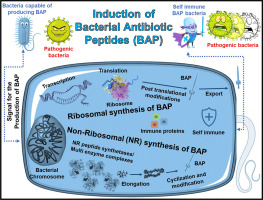
A Novel Antibiotic Created to Target Specific Bacteria Utilizing AI
The emergence of a novel antibiotic aimed at addressing a specific strain of bacteria while preserving beneficial bacteria may present a significant advancement for individuals afflicted with inflammatory bowel diseases (IBD), including Crohn’s disease. This groundbreaking advancement is part of a growing trend in drug development enabled by artificial intelligence (AI).
Historically, antibiotics have been broad-spectrum, attacking both harmful and beneficial bacteria, resulting in imbalances within gut flora. In conditions like Crohn’s disease, patients frequently suffer from excessive colonization of invasive strains of Enterobacteriaceae, particularly the invasive strain of Escherichia coli (E. coli), which is notoriously resistant to various antibiotics. Worldwide, millions are affected by Crohn’s, with about 30% experiencing invasive E. coli infections, which limits their treatment alternatives, as highlighted by Jonathan Stokes, a computational chemist at McMaster University in Canada.
Stokes and his research team have evaluated over 10,000 molecules and pinpointed those that are effective against the invasive E. coli. They uncovered enterololin, a molecule unlike any recognized antibiotic, specifically aimed at the Enterobacteriaceae family. The efficacy of enterololin is amplified when combined with SPR741, which disrupts the membranes of Gram-negative bacteria, resulting in a minimum inhibitory concentration (MIC) significantly lower than that of many current antibiotics.
Research has indicated that this antibiotic pairing eliminates the invasive E. coli in mouse models without disturbing beneficial bacteria and, importantly, without adverse effects, even at higher dosages. To ascertain the target of enterololin, the researchers employed a machine learning (ML) model to predict binding poses of small molecules. They found that enterololin targets a protein complex that is linked to antibiotic resistance in these bacteria. This AI-fueled approach significantly diminished both the time and costs associated with drug development, affirming the potential of AI in optimizing such processes.
Since the identification of halicin in 2020, AI has been crucial in crafting innovative antimicrobials. While the promise is clear, AI-driven antibiotics have not yet proceeded to human trials, and inquiries regarding AI’s effectiveness in drug discovery persist.
Professionals like Olivier Espéli, a bacteriologist at Collège de France, and Maria Teresa Abreu, a gastroenterologist at Cedars-Sinai hospital in the US, recognize the encouraging prospects of this antibiotic but emphasize the necessity for human clinical trials to confirm its effectiveness and safety. The success of such a treatment could represent a critical advancement in tackling antibiotic-resistant infections in IBD patients.